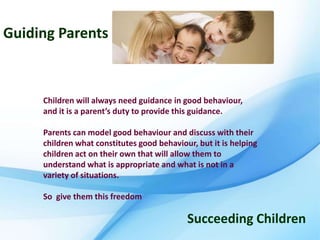
Enforcement
- 1. Guiding Parents Children will always need guidance in good behaviour, and it is a parent’s duty to provide this guidance. Parents can model good behaviour and discuss with their children what constitutes good behaviour, but it is helping children act on their own that will allow them to understand what is appropriate and what is not in a variety of situations. So give them this freedom Succeeding Children
- 2. Using positive and negative reinforcement are two excellent ways to help children identify and display good behaviour as well as understand and avoid bad behaviour.
- 3. Children and Positive Reinforcement • Everyone likes to be praised and children are no different. • When children display good behaviour, parents should acknowledge their actions by congratulating their children on their decisions. • Such positive reinforcements allow children to connect that what they did has made their parents happy, and therefore was the correct choice.
- 4. While praising a child specify the behaviour For Example : If a child makes a beautiful drawing , instead of saying “Good” or “Good Work” say “Wow your colour combination is so beautiful and you have coloured within the boundary” Be specific, Be Clear in appreciating the child And say it with ENTHUSIASM
- 5. We should praise effort, never talent. We should teach kids to see challenges as learning opportunities rather than threats and that we should emphasize how abilities can be transformed.
- 6. Children and Negative Reinforcement • Negative reinforcement is the opposite of positive reinforcement. • When a child chooses to act inappropriately or misbehave, a parent should greet these behaviours with a negative attitude. • Be Firm and assertive • Don’t Shout
- 7. Important to remember • Parents should be sure to address the behaviour in negative terms, not the child. • It is important that children do not feel that their parents believe that they are bad, irresponsible or stupid. • Always addressing the behaviour, rather than the child, will help make this distinction. • Parents should also be sure not to punish children.
- 8. Example If a child is denied playing for not tidying his toys he will not necessarily learn why tidying toys is important, he will only learn that if he does something “bad” then something “bad” will happen to him. Set limits and boundaries with the child. Don’t force
- 9. WARNING • Use three warning signs • Make the child clear with the rules and boundaries and consequences of not following them • If the child does something wrong you need to give space of three warnings to him to correct his behaviour • If the same inappropriate behaviour persists after three warnings then the harsher consequences should be followed for Eg. Deduction of one hour TV viewing .
- 10. BUT…. If the child corrects his behaviour between these three warnings then as a parent it is important to appreciate . Example: “Good you have corrected your behaviour ,I like it when you obey” “ Kitne acche lagte ho jab aap baat maan jate ho aur galti sudhar lete ho, Good !!!!!”
- 11. Punishment does not necessarily teach a lesson, but using negative reinforcement should.
- 12. Self Realization “Often, it’s not about becoming a new person, but becoming the person you were meant to be, and already are, but don’t know how to be.” Make them realize.
- 13. Remember • Helping children realize which behaviours are appropriate and responsible is part of a parent’s job description. • There are two ways parents can help teach children good behaviour, through positive reinforcement of good behaviours and negative reinforcement of bad behaviours.
- 14. Remember Parents should always remain vigilant that they are addressing the behaviors and not the child so that it is obvious that they are not telling a child that they are inherently good or bad as a person.
- 15. Don’t Forget • Change is not like a instant coffee. • It requires lot of constant efforts. • If you want to change the child’s behaviour you need to change your strategies. • NEVER GIVE UP ………… Prepared By Deepti Malhotra